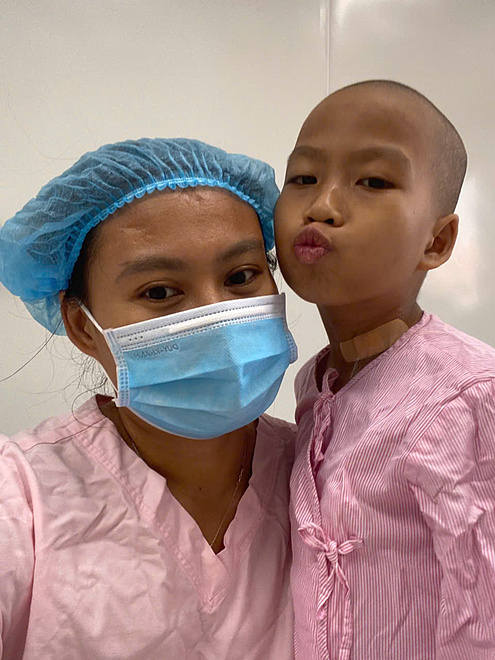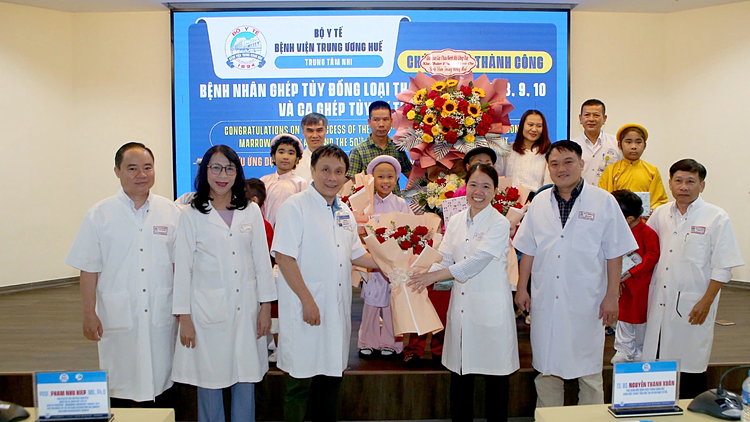Thalassemia, an inherited blood disorder, causes anemia and requires patients to undergo frequent blood transfusions, often monthly, to replenish red blood cells and remove excess iron. Life for those with thalassemia often revolves around hospital visits for transfusions and treatment for complications like heart failure and liver cirrhosis caused by iron overload. For Han, this meant monthly or twice-monthly transfusions lasting 4–6 hours each, sometimes requiring week-long hospital stays for monitoring, for the past 10 years.
"For 10 years, I've longed for the day my daughter could come home without worrying about her next transfusion," Han's mother, Duong Thi Ai, said on 29/7, after Han's successful bone marrow transplant at Hue Central Hospital.
A bone marrow transplant, also known as a stem cell transplant, is the only cure for thalassemia. However, the procedure is expensive, costing around 500 million VND (Vietnamese Dong), with the cost of sterile isolation rooms not covered by health insurance. This presents a significant financial burden for families like Han's, who struggle financially.
Fortunately, Han's 8-year-old sister, Le Phuong Bao Anh, was a match and able to donate her bone marrow. The Sun of Hope program (Hope Foundation - VnExpress newspaper) also provided financial assistance for the transplant, which took place in early July. The 7-hour procedure was complicated by a transfusion-related infection, but Han successfully overcame it.
Half a month later, on 29/7, Han remained hospitalized but was recovering well, with doctors deeming the transplant a success. She is expected to regain her health and no longer require transfusions.
Her mother sat by her bedside, watching her daughter rest. The 10-year-old, smaller than her peers, had thin limbs, pale yellow skin, and arms covered in bruises from countless needle pricks—evidence of hundreds of transfusions over the past decade.
"Seeing her get stronger each day, our family is incredibly grateful to the doctors for giving her a new life," her mother shared.
 |
Han and her mother in the transplant room. Photo: *Family provided* |
Thalassemia is an inherited disease; if one family member has it, all siblings should be screened. Two carriers of the thalassemia gene should ideally not marry, or if they do, prenatal diagnosis is crucial. If two carriers have children, there's a 50% chance their child will inherit the gene, a 25% chance of developing severe thalassemia requiring lifelong transfusions and medication, and only a 25% chance of being born healthy. In Han's case, both parents carried the gene without symptoms, passing it to their firstborn, Han. Their second child, Han's sister, did not inherit the gene, making her a suitable donor.
Thalassemia places a tremendous burden on affected families. The average treatment cost for a patient from birth to age 30 is approximately 3 billion VND. In Vietnam, it's estimated that over 12 million people carry the thalassemia gene. Many are unaware they are carriers, as they may exhibit no symptoms or only mild anemia, as was the case with Han's parents.
Therefore, thalassemia is a societal issue with serious implications for the economy, quality of life, and the future of the nation. Prevention through screening and early detection of the gene in premarital and prenatal stages is the most effective control measure.
 |
Han is congratulated by doctors after her transplant, preparing for discharge. Photo: *Lan Huong* |
| With the goal of bringing hope to children with cancer, the Hope Foundation, in collaboration with the Mr. Sun program, has launched the Sun of Hope program. Every contribution from the community is a ray of light sent to the future generation of our country. Readers can contribute to the program here: |
Program Name: Ten cua ban - Mat Troi Hy Vong
Program ID: 195961
Thuy Quynh












